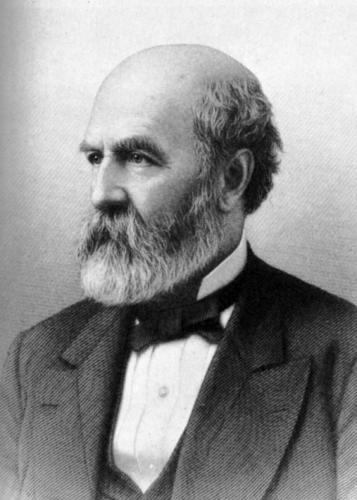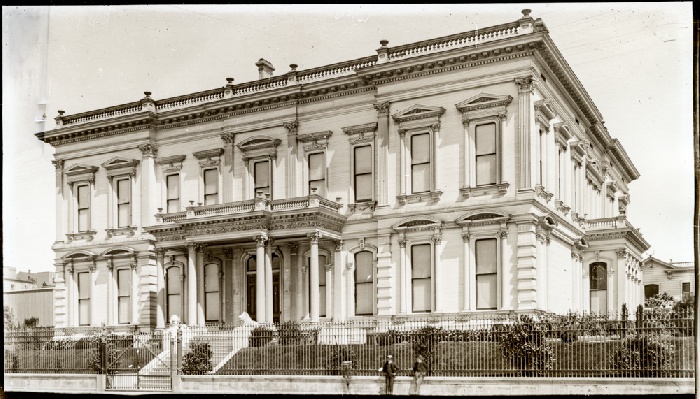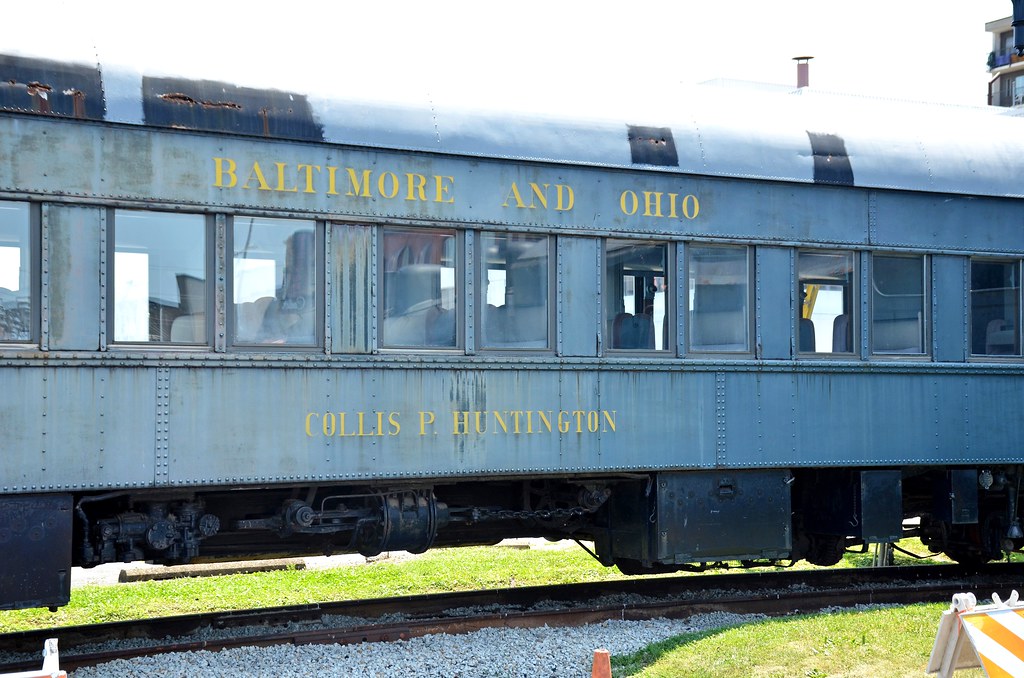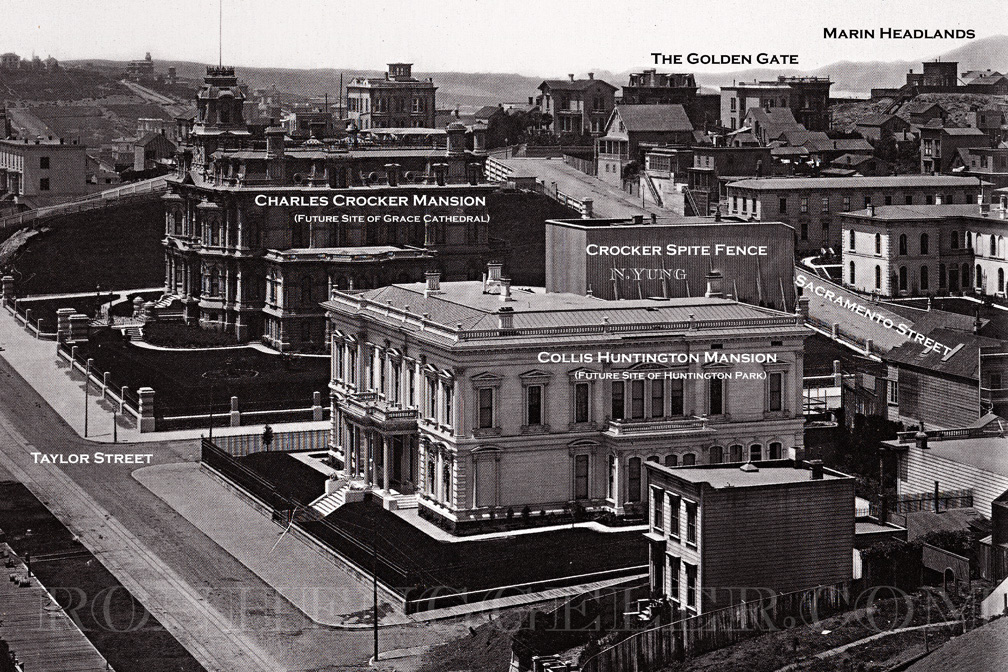Collis Potter Huntington
American Industrialist and Railway Magnate

Raised in poverty, he left school at age 14 and became a Yankee peddler, traveling through the South to sell watches and other merchandise. Later he opened a general store at Oneonta, New York. When gold was discovered in California in 1848, Huntington went west and became a rich man, not from mining but by selling supplies to the miners.
Collis Potter Huntington (October 22, 1821 - August 13, 1900) was an American industrialist and railway magnate. He was one of the Big Four of western railroading (along with Leland Stanford, Mark Hopkins, and Charles Crocker) who invested in Theodore Judah's idea to build the Central Pacific Railroad as part of the first U.S. transcontinental railroad. Huntington helped lead and develop other major interstate lines, such as the Southern Pacific Railroad and the Chesapeake & Ohio Railway (C&O), which he was recruited to help complete. The C&O, completed in 1873, fulfilled a long-held dream of Virginians of a rail link from the James River at Richmond to the Ohio River Valley. The new railroad facilities adjacent to the river there resulted in expansion of the former small town of Guyandotte, West Virginia into part of a new city which was named Huntington in his honor.
Turning attention to the eastern end of the line at Richmond, Huntington directed the C&O's Peninsula Extension in 1881-82, which opened a pathway for West Virginia bituminous coal to reach new coal piers on the harbor of Hampton Roads for export shipping. He also is credited with the development of Newport News Shipbuilding and Drydock Company, as well as the incorporation of Newport News, Virginia as a new independent city. After his death, both his nephew Henry E. Huntington and his stepson Archer M. Huntington continued his work at Newport News. All three are considered founding fathers in the community, with local features named in honor of each.

From his base in Washington, Huntington was a lobbyist for the Central Pacific and the Southern Pacific in the 1870s and 1880s. The Big Four had built a powerful political machine, which he had a large role in running. He was generous in providing bribes to politicians and congressmen. Revelation of his misdeeds in 1883 made him one of the most hated railroad men in the country.
Much of the railroad and industrial development which Collis P. Huntington envisioned and led are still important activities in the early 21st century. The Southern Pacific is now part of the Union Pacific Railroad, and the C&O became part of CSX Transportation, each major U.S. railroad systems. West Virginia coal is still transported by rail to be loaded onto colliers at Hampton Roads. Nearby, Huntington Ingalls Industries operates the massive shipyard at Newport News.
Building the first U.S. transcontinental railroad
Between 1883 and 1889, Hill built his railroads across Minnesota, into Wisconsin, and across North Dakota to Montana.

In the late 1850s, Huntington and Hopkins joined forces with two other successful businessmen, Leland Stanford and Charles Crocker, to pursue the idea of creating a rail line that would connect America's east and west. In 1861, these four businessmen (sometimes referred to as The Big Four) pooled their resources and business acumen, and formed the Central Pacific Railroad company to create the western link of America's First transcontinental railroad. Of the four, Huntington had a reputation for being the most ruthless in pursuing the railroad's business; he ousted his partner, Stanford.
Huntington negotiated in Washington, D.C., with Grenville Dodge, who was supervising railroad construction from the East, over where the railroads should meet. They completed their agreement in April 1869, deciding to meet at Promontory Summit, Utah. On May 10, 1869, at Promontory, the tracks of the Central Pacific Railroad joined with the tracks of the Union Pacific Railroad, and America had a transcontinental railroad. The joining was celebrated by the driving of the golden spike, provided for the occasion as a gift to the CPRR by San Francisco banker and merchant David Hewes
Southern Pacific Railroad

Beginning in 1865, Huntington was also involved in the establishment of the Southern Pacific Railroad with the Big Four principals of the Central Pacific Railroad. The railroad's first locomotive C. P. Huntington, (transferred from the CPR), was named in his honor. With rail lines from New Orleans to the Southwest and into California, Southern Pacific expanded to more than 9,000 miles of track. It also controlled 5,000 miles of connecting steamship lines. Using the Southern Pacific Railroad, Huntington endeavored to prevent the port at San Pedro from becoming the main Port of Los Angeles in the Free Harbor Fight.
After Huntington's death in 1900, his nephew, Henry E. Huntington, assumed leadership of many of his industrial endeavors. The younger man quickly sold off all of the Southern Pacific holdings. He and other family members also continued and expanded many of the senior Huntington's cultural and philanthropic projects, in addition to developing their own.
Legacy
Huntington was an ardent opponent of racial prejudice and discrimination, Huntington had been an abolitionist before the Civil War, and he later donated hundreds of thousands of dollars to support African American churches in California, and schools and colleges in the southern states. Though it was politically unwise, Huntington ordered his companies to give equal employment and pay to black workers, and he publicly opposed the exclusions of black and other non-white children from public schools, as well as other "Jim Crow" restrictions then being enacted in the South and elsewhere. In newspaper columns and public speeches in the West, Huntington praised the Chinese for their culture and industry, and condemned state and federal discrimination against American Indians and Chinese, Filipino, and Japanese immigrants. "If we deny to the individual, no matter what his creed, his color or his nationality, the right to justice which every man possesses," he told a gathering of California civic and railway leaders in 1900, "there will be no enduring prosperity and the nation's decline will surely follow."
In 1968, Huntington was inducted into the Hall of Great Westerners of the National Cowboy & Western Heritage Museum.